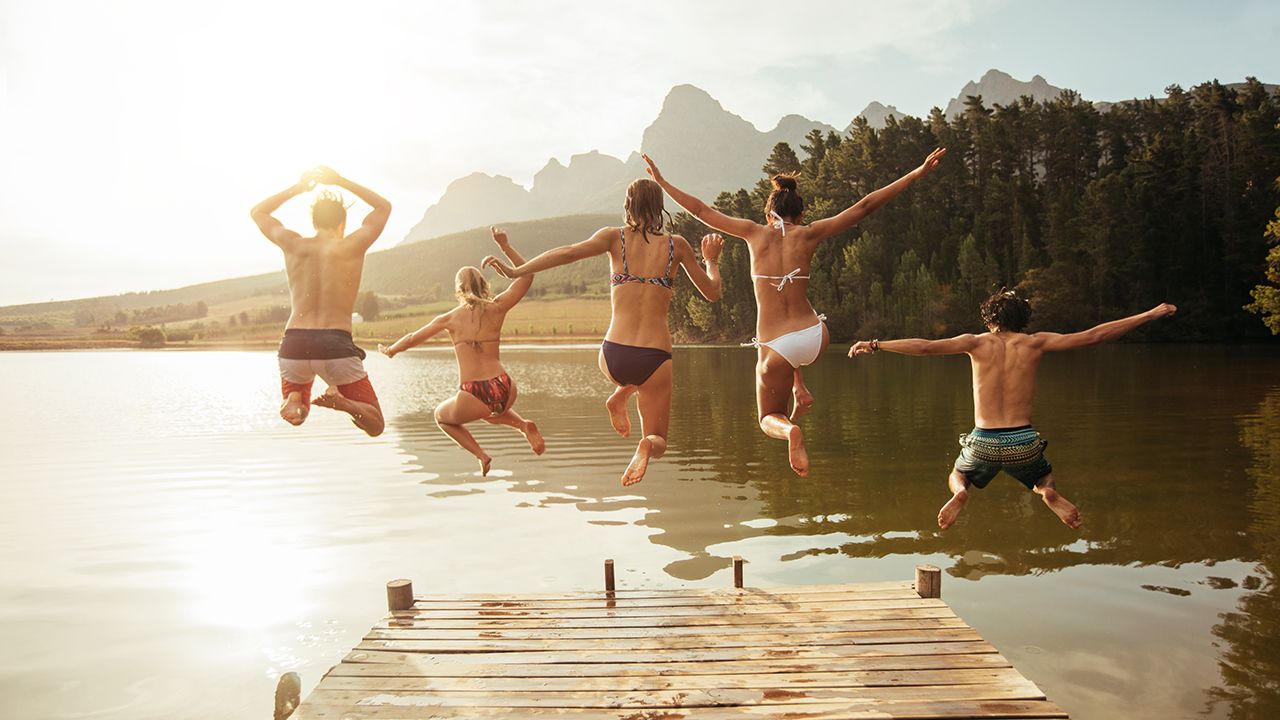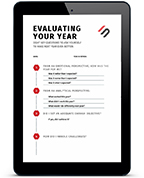How to Keep Your Mental Fitness as an Athlete

And Still Enjoy the Holiday Season
Ah, the holiday season.
For many, this means plenty of food, family gatherings, and a well-deserved break from our regular routines. And it's the time of year when many sports are taking a break, so for elite and professional athletes, the holidays bring a unique set of challenges – how to stay mentally fit and keep up with your training while still enjoying some downtime.
As we hurtle into a new year, we're going to look at downtime; taking time out of your sport. Because we've got to be careful, and be really conscious about how we handle downtime after being so full throttle. The minute we take our foot off the accelerator, we're either going to stall or we're just going to crash. So as an athlete, what are you doing with your time in order to coast your way through this holiday season in the best way possible?
I'm sure previous to this, you were spending most of your day fully engulfed in your sport, in your preparation. You must have spent a lot of your day working towards your objectives, making sure that you're physically prepared, technically prepared, and obviously, from our perspective, mentally prepared.
So what do we do when we come to this time of year where most people around the world stop?
The momentum just dies.
When we hit this time of year where the majority of people are slowing down, not having to get out of bed early in the morning to train or coach, or they're taking one, two, three, four.. maybe even more weeks off, I talk to athletes about making sure their mental machine is still ticking over. Keep it idling along into the new year at a speed that maintains traction and momentum. Because traction and momentum equal progress and consistency.
Living here in Australia between the middle of December and the end of January, it's like a ghost town. Everything shuts. Yet in my mind, that's a great opportunity to make the most of that quieter time. So what do we do as an athlete? As a coach? And what do we do as a parent during this downtime?
Often as a parent, when we have elite or professional athletes we don't see all year, all of a sudden they're hanging around a lot more. And so we start to notice behavioural traits. Maybe we don't see what we think we should see. So all these kind of things can add to the emotional weight of that downtime and the efficiency of that downtime.
Now, I'm not arguing that we shouldn't have downtime. I think it's incredibly important that we balance our life. And many of you who've listened to my podcast or attended my live trainings or clinics will know I often talk about the 'off' athlete as much as I talk about the 'on' athlete. So from a mental, emotional and cognitive perspective, I think downtime is incredibly important, and just as valuable to athletes as the 'on' time. So this off time needs to be managed just as efficiently. If it's just as valuable to us, then we put just as much thought into how we manage it.
So we do have some downtime. If traction and momentum equals our progress and consistency, and we don't allow our body to keep idling, our mind to keep active, our progress to keep edging forward, then we will stall. And we know how hard it is to get something moving again that has stopped.
As appealing as it might be for you to lay with your feet up and do nothing, I urge you to consider how hard it will be for you to get moving again.
A few years ago, just before Christmas, I broke my foot and took six months off running. Endurance-based running is what I do to think, to process. So when that came to a grinding halt, it took me another six months just to get momentum up and going again. Of course, I kept my mind active and my body fairly fit, but the endurance running was gone, and I had to start again. Even knowing what I know, it was incredibly difficult. So I urge you to think about how you handle this downtime.
And it is possible to enjoy the holiday season while still keeping your mental fitness in check. Here are five key steps to consider, designed to keep the engine in your brain and body ticking over, so you don't have to start up again from a stopped position:
1. Keep Training, and Set Realistic Goals for Yourself
Train at 20-40% of your Normal Intensity
It's okay to relax and take a break from your training routine during the holidays AND set some goals for yourself so you can stay motivated and on track. If you think about last year, you probably operated at 80-100%, depending if you were in competition or in competition preparation time. During the holiday season, half that to between 20 and 40% of the effort that you put into your training.
You can do this by picking the few things that you know are integral to sustaining your fitness, maintaining your mental agility, and for your specific sport. Notice I said integral things, which might not be the same few things you enjoy doing. For example, if you're a cricket player, there will be different sport-specific things that you want to do during the downtime than if you were an ice skater or a formula driver. So find those specific to your sport that are key to your fitness and mental agility, and keep doing them at 20 and 40% of your normal intensity in your training.
2. Learn Something New
Change is as Good as a Holiday
Stimulate your brain to do something or think in some way that you've never thought before, by learning something new. This doesn’t mean revamping something you've been doing all year. Stimulate your brain. Do something to further your understanding of your sport, of your body, the mental necessities of you as an athlete. So either: research it on the internet; go and do a course; go and speak to some key people; attend a course that's specific for you as an individual or as a sports person. So set yourself time to learn something new.
- If you've only got a couple of weeks of downtime before the start of the new season, perhaps use the time to broaden your perspective by doing some research. Jump on YouTube and learn some new techniques.
- If you've got six to eight weeks off, find somebody to talk to, somebody who's going to challenge your thought process and offer a unique view, allow your mind to think outside your normal familiarity.
- If you've got longer time off, which not many sports do these days, but if you are one of those very few sports that do that, I urge you to go and do something that's quite challenging. When I say challenging, I don't mean something you'll hate doing. Something that's going to stimulate you, that's going to keep that engine ticking over, keep that fire burning inside you. And enjoy it.
3. Maintain Communication with your Entourage
It's Important to Stay Connected with your Support Network, Especially During the Holidays
You've probably worked all year to keep your communication efficient and effective with the people you've put around you. Keep the communication level up. If you stop that now, come new year, you're going to have a degree of awkwardness once you finally break your silence and have to reinstate that initial learning process again. It may just be a conversation, however, you don't want to start from a stationary position. Maintain an easy level of openness and communication with your entourage team to stay on track.
When we're talking about entourage, we're talking about your physical coach, training coach, strength and conditioning coach, your technical coach as well as those who look after you physically such as your chiropractor, physiotherapist, nutritionist. Those are key people to keep open communication with, especially over the silly season when physical conditioning and nutrition tends to take a hit. None of us want to get back to training and realise you can't fit into the uniform anymore.
And having the right nutrition helps mentally as much as it does physically.
4. Watch What you Eat, Watch What you Drink
Discipline Versus Reward
When training throughout the year and competing, socialisation happens naturally. Athletes are renowned for working hard so they can party hard. And in some sports, that balance can become skewed during time off. Not everybody, but it does happen. Athletes don't always have the same degree of ‘discipline versus reward’ during the holiday season. So make sure you're cognitively aware of that so you don't fall into following the herd. It doesn't take the body long to get out of kilter when it comes to physical conditioning. Eat smart and if you're going to drink, make sure its done in a way that you can manage.
The other side of that is getting caught up with the crowd when celebrating during off time. You deserve to reward yourself, however remember what you do during this period will stay with you when you go into next season. If you're in a sport where you need to be selected to represent your country, and during the holiday season you were banged up for Drunk and Disorderly, that's going to have an impact. And in today's world, somebody will take a Snap, or put it on Facebook or Instagram, and bang, that's affected next season.
So be conscious of those things and make your mindset: This is my profession. I'm an elite athlete and I maintain my momentum. I deserve downtime, my off-athlete time is important to me, but I don't want my off time to affect my on time. I'm still an athlete during this period.
5. Evaluate the Previous Year
We Cannot Change or Replicate that Which we do not First Measure
We don't want to get to the end of the year, enjoy the downtime and forget all the lessons from the last twelve months. Make sure every possible lesson is learnt so when we go forward, we're smarter with it and know what we need to do with those lessons.
Every year with my athletes, I go through a 20-point checklist of what's happened over the last 12 months. We look at and evaluate everything that's gone on: in their approach, their communication, their results, their interactivity, their motivation, their consistency, to name a few focus areas.
This 20-point checklist is done with every athlete and every season and if you would like to learn eight of those that you can do during this downtime, you can learn those here.
The Holidays can be a Tricky Time for Athletes
With these five key strategies you can maintain your mental fitness and still have a festive holiday season and effective downtime.
If you’d like my personal support, come join us in the free Smart Mind Community by CLICKING HERE.


